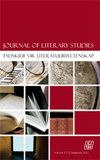写一个南非流行病的时刻:封锁系列中的不平等和暴力
IF 0.1
4区 文学
0 LITERARY THEORY & CRITICISM
引用次数: 0
摘要
本文探讨了《禁闭集》(2020)中占绝对主导地位的个人散文类型是如何因为其简洁和共鸣而成为捕捉南非最初硬封锁的即时性的合适媒介的。虽然这些文章反映了遏制病毒的政策,社会习俗的丧失和改变,但它们不可避免地揭示了每个作者的身份,以及这种身份如何在南非人的想象中存在。这个称呼本身就包含了在严重不平等和无处不在的暴力背景下基于种族和阶级的兄弟会,并使其复杂化。这些文章显示了对这两个方面之间密切关系的认识,并从2019冠状病毒病的挑战中吸取教训并提出建议,将它们作为恐惧的解药和对更美好南非的渴望。OpsommingHierdie artikel最好地研究了这种类型,而这种类型的主导是在《禁闭集》(2020)中,这是一篇类似于人的散文,而geskikkmedium则是在《南方非洲》中,这种媒介是在《南方非洲》中,类似于《南方非洲》的强烈链接,而《南方非洲》则是在《南方非洲》中被称为“南方非洲”的。因此,我们可以将文章的内容与病毒的内容进行比较,将文章的内容与社会便利的内容进行比较,将文章的内容与外界的内容进行比较。这两种方法都可以在范德苏-阿非利卡大学中找到。他把自己的名字命名为“我的朋友”,他的名字是“我的朋友”,他的名字是“我的朋友”,他的名字是“我的朋友”,他的名字是“我的朋友”。这两篇文章的主题都是“我很喜欢”、“我喜欢”、“我喜欢”、“我喜欢”、“我喜欢”、“我喜欢”、“我喜欢”、“我喜欢”、“我喜欢”、“我喜欢”、“我喜欢”、“我喜欢”、“我喜欢”。本文章由计算机程序翻译,如有差异,请以英文原文为准。
Writing a South African Pandemic Moment: Inequality and Violence in The Lockdown Collection
This article examines how the overwhelmingly dominant genre in The Lockdown Collection (2020), the personal essay, is an appropriate medium to capture the immediacy of the initial hard lockdown in South Africa because of its brevity and resonance. While the essays react to policies of virus containment, the loss and alteration of social conventions, they inevitably reveal the identity of each author and how that identity sits in the imagination of South Africanness. This appellation itself incorporates and complicates fraternities that are race and class based in a context of acute inequality and ubiquitous violence. The essays display an awareness of the strong relationship between these two aspects and writing about them appears as an antidote to fear and a desire for a better South Africa, as learnt from and suggested by the challenges of Covid-19.
Opsomming
Hierdie artikel bestudeer hoe die genre wat oorweldigend dominant is in The Lockdown Collection (2020), naamlik die persoonlike essay, 'n geskikte medium is om die onmiddellikheid van die aanvanklike streng inperking in Suid-Afrika vas te vang—vanwee die beknoptheid en weerklank daarvan. Terwyl die essays 'n reaksie op beleide van virusbekamping, die verlies en wysiging van sosiale konvensies is, word die identiteit van elke outeur uiteraard onthul. Dit wys ook hoe daardie identiteit in die verbeelding van Suid-Afrikaansheid daar uitsien. Hierdie benaming opsigself beliggaam en kompliseer gemeenskappe wat op ras en klas gebaseer is in 'n konteks van akute ongelykheid en alomteenwoordige geweld. Die essays toon 'n bewustheid van die sterk verbintenis tussen hierdie twee aspekte—en om daaroor te skryf blyk 'n teenmiddel vir vrees en 'n hunkering na 'n beter Suid-Afrika te wees, soos die uitdagings wat Covid-19 meegebring het suggereer en ons inderdaad geleer het.
求助全文
通过发布文献求助,成功后即可免费获取论文全文。
去求助
来源期刊

Journal of Literary Studies
Multiple-
CiteScore
0.50
自引率
0.00%
发文量
0
期刊介绍:
The Journal of Literary Studies publishes and globally disseminates original and cutting-edge research informed by Literary and Cultural Theory. The Journal is an independent quarterly publication owned and published by the South African Literary Society in partnership with Unisa Press and Taylor & Francis. It is housed and produced in the division Theory of Literature at the University of South Africa and is accredited and subsidised by the South African Department of Higher Education and Training. The aim of the journal is to publish articles and full-length review essays informed by Literary Theory in the General Literary Theory subject area and mostly covering Formalism, New Criticism, Semiotics, Structuralism, Marxism, Poststructuralism, Psychoanalysis, Gender studies, New Historicism, Ecocriticism, Animal Studies, Reception Theory, Comparative Literature, Narrative Theory, Drama Theory, Poetry Theory, and Biography and Autobiography.
 求助内容:
求助内容: 应助结果提醒方式:
应助结果提醒方式:


